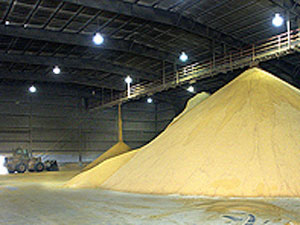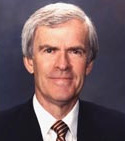Exports of the primary by-product of ethanol production are continuing to skyrocket.
 According to USDA’s Foreign Agriculture Service, exports of distillers grains from the United States nearly doubled last year, up more than 90% from 2007 to total 4.51 million metric tons. Distillers grains are an ethanol co-product used as livestock feed.
According to USDA’s Foreign Agriculture Service, exports of distillers grains from the United States nearly doubled last year, up more than 90% from 2007 to total 4.51 million metric tons. Distillers grains are an ethanol co-product used as livestock feed.
About one-third of every bushel of corn used to produce ethanol becomes distillers grains, which Renewable Fuels Association Vice President of Research and Analysis Geoff Cooper says have become a very valuable co-product for ethanol producers. “This increasing production and use of distillers grains is providing livestock feeders across the globe with a high protein source of feed that can partially displace the need for whole corn and soybean meal in feed rations,” said Cooper. “As a result, distillers grains are an important and often overlooked component of both the fictitious debate about food versus fuel and the ongoing discourse surrounding the science of land use change.”
The largest markets for exports of distillers grains from the United States in 2008 were Mexico, Canada and Turkey.


 Less than six months after opening a biodiesel plant in petroleum country, Iowa-based Renewable Energy Group has opened its Houston biodiesel facility for 24-hour a day pickup for trucks… the first of its kind in the Houston area.
Less than six months after opening a biodiesel plant in petroleum country, Iowa-based Renewable Energy Group has opened its Houston biodiesel facility for 24-hour a day pickup for trucks… the first of its kind in the Houston area. This story from The Daily Oklahoman
This story from The Daily Oklahoman The American Lung Association of Wisconsin will be sponsoring the UW-Platteville Society of Automotive Engineering (SAE) Clean Snowmobile Challenge team in a project designed to inspire students and showcase innovative, cleaner energy technologies. As part of SAE’s Clean Snowmobile Challenge, the group modified a stock snowmobile to operate on E85.
The American Lung Association of Wisconsin will be sponsoring the UW-Platteville Society of Automotive Engineering (SAE) Clean Snowmobile Challenge team in a project designed to inspire students and showcase innovative, cleaner energy technologies. As part of SAE’s Clean Snowmobile Challenge, the group modified a stock snowmobile to operate on E85. Renewable energy and biofuels are among the big winners in the $787 billion economic stimulus package signed by President Barack Obama today.
Renewable energy and biofuels are among the big winners in the $787 billion economic stimulus package signed by President Barack Obama today. The
The  Geldof, an Irish musician who launched his activist career by organizing Live Aid in 1985, will discuss how he believes biofuels can help developing countries become more energy independent without impacting food production. He and along with other speakers will discuss the sustainable bio future and how this could help eradicate poverty, particularly across the African continent.
Geldof, an Irish musician who launched his activist career by organizing Live Aid in 1985, will discuss how he believes biofuels can help developing countries become more energy independent without impacting food production. He and along with other speakers will discuss the sustainable bio future and how this could help eradicate poverty, particularly across the African continent. In an interview with WBM, Geldof explained how he sees biofuels helping Africa. “Import substitution. More money in the economy. More jobs. Domestic fuel at the local level,” he says. “Africa has always used “bio-fuel” as a primary source – wood, dung, residue etc. They can build responsibly on this tradition.”
In an interview with WBM, Geldof explained how he sees biofuels helping Africa. “Import substitution. More money in the economy. More jobs. Domestic fuel at the local level,” he says. “Africa has always used “bio-fuel” as a primary source – wood, dung, residue etc. They can build responsibly on this tradition.” A wind energy project in Southern California soon could be lighting up 50,000 homes. The Acciona Wind Energy USA wind farm will be Santa Barbara County’s first renewable wind-energy project after the county Board of Supervisors gave unanimous approval to the project.
A wind energy project in Southern California soon could be lighting up 50,000 homes. The Acciona Wind Energy USA wind farm will be Santa Barbara County’s first renewable wind-energy project after the county Board of Supervisors gave unanimous approval to the project. Writing about a green fuel could earn you some green for school! The American Lung Association’s Minnesota and South Dakota field offices, in conjunction with their respective states’ soybean promotion councils, are offering scholarships to students who write essays on biodiesel.
Writing about a green fuel could earn you some green for school! The American Lung Association’s Minnesota and South Dakota field offices, in conjunction with their respective states’ soybean promotion councils, are offering scholarships to students who write essays on biodiesel. In Minnesota, winners will receive $1,000, while second place gets a $500 scholarship. South Dakota winners get $500, and second place receives $250.
In Minnesota, winners will receive $1,000, while second place gets a $500 scholarship. South Dakota winners get $500, and second place receives $250. Senator Jeff Bingaman (D-NM), chairman of the Senate Energy and Natural Resources Committee, said in a recent
Senator Jeff Bingaman (D-NM), chairman of the Senate Energy and Natural Resources Committee, said in a recent  Meanwhile, Secretary of Agriculture Tom Vilsack recently said in an
Meanwhile, Secretary of Agriculture Tom Vilsack recently said in an  Galva Holstein Ag, LLC has opened their third E85 fueling location in Iowa. The site is located at 211 North Main Street (Highway 59) in Holstein. Other fuels offered include E10, E30 biodiesel and regular unleaded gasoline.
Galva Holstein Ag, LLC has opened their third E85 fueling location in Iowa. The site is located at 211 North Main Street (Highway 59) in Holstein. Other fuels offered include E10, E30 biodiesel and regular unleaded gasoline.